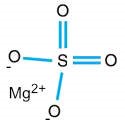Do you suffer from insomnia, muscle cramps, delayed-onset muscles soreness? If so, then your physical or massage therapist may recommend Epsom salt without even knowing why. In its multitude of benefits, Epsom salts are said to improve sleep, reduce inflammation, improve muscles cramps, wound healing and much more. Epsom comes from the name of the English town that the mineral compound, magnesium sulfate, was first discovered. It was extracted by boiling water from a bitter saline spring that people would soak in for great health benefits. The medicinal properties are said to be established by a chemist Nehemiah Grew in 1695, who acquired a royal patent for exclusive manufacturing rights. Today, Epsom salts are a main ingredient in most bath salts and soaks and can be found at almost any pharmacy or bath specialty stores. Before you go take a soak, what does the science say?
Well the inconvenient truth is that there is little to no research on the effects of bathing in an Epsom salt bath. There are endless blogs out there with endless claims about the health benefits of Epsom with nothing to back it up. For example, there’s a claim that it’s good for people who are magnesium deficient, but there’s no evidence the magnesium is absorbed through the skin. After searching for articles for magnesium sulfate, bath salts, Epsom salts, I have found not a single article that even investigates Epsom salt baths. The closest thing I found was a patent for methods of different bath soaks, which just boil down to saying put salt in warm water and soak for 15 minutes. Other bloggers seem to have the same problem when trying to find the proof, (in the references below is a link to another similar article.)
 I did however find articles about other medical uses for magnesium sulfate. In the study from Maternal-Fetal Medicine Units Network, they wanted to test if magnesium sulfate could help prevent cerebral palsy in preterm babies. 2241 women at imminent risk for delivery between 24 and 31 weeks of gestation, were randomized into experimental (magnesium sulfate) and placebo (control) groups. Each group receive magnesium sulfate, administered intravenously as a 6-g bolus followed by a constant infusion of 2 g per hour, or matching placebo. After a follow up analysis, the rate of the primary outcome was not significantly different in the magnesium sulfate group and the placebo group. However, in a secondary analysis, moderate or severe cerebral palsy occurred significantly less frequently in the magnesium sulfate group. The risk of death did not differ significantly between the groups.
I did however find articles about other medical uses for magnesium sulfate. In the study from Maternal-Fetal Medicine Units Network, they wanted to test if magnesium sulfate could help prevent cerebral palsy in preterm babies. 2241 women at imminent risk for delivery between 24 and 31 weeks of gestation, were randomized into experimental (magnesium sulfate) and placebo (control) groups. Each group receive magnesium sulfate, administered intravenously as a 6-g bolus followed by a constant infusion of 2 g per hour, or matching placebo. After a follow up analysis, the rate of the primary outcome was not significantly different in the magnesium sulfate group and the placebo group. However, in a secondary analysis, moderate or severe cerebral palsy occurred significantly less frequently in the magnesium sulfate group. The risk of death did not differ significantly between the groups.
In my references, there is also another article about using magnesium sulfate to treat polymorphic ventricular tachycardia. Long story short is there is no evidence to support the claims people make about Epsom salt baths. I’m surprised there isn’t any actual science considering a folk remedy that been around for hundreds of years. We can only go by What other people say. I can see some merit to the muscle relaxation benefit because magnesium sulfate can be used as a laxative and magnesium chloride is a common ingredient in rescue inhalers, in both cases it relaxes muscles. But again, there is no research on it. The best thing to do is try it and see if it works for you.
Questions to consider
Do you use Epsom salt? If so, Why?
Do you feel it helps?
Any thoughts why there is no research?
References
Dwight J. Rouse, M.D., Deborah G. Hirtz, M.D., for the Eunice Kennedy Shriver NICHD Maternal–Fetal Medicine Units Network*
N Engl J Med 2008; 359:895-905 August 28, 2008 DOI: 10.1056/NEJMoa0801187
Treatment of torsade de pointes with magnesium sulfate.
D Tzivoni, S Banai, C Schuger, J Benhorin, A Keren, S Gottlieb and S Stern
Circulation. 1988;77:392-397, originally published February 1, 1988
https://doi.org/10.1161/01.CIR.77.2.392
http://www.epsomsaltsoakbath.com/history-of-epsom-salt/
https://www.painscience.com/articles/epsom-salts.php

